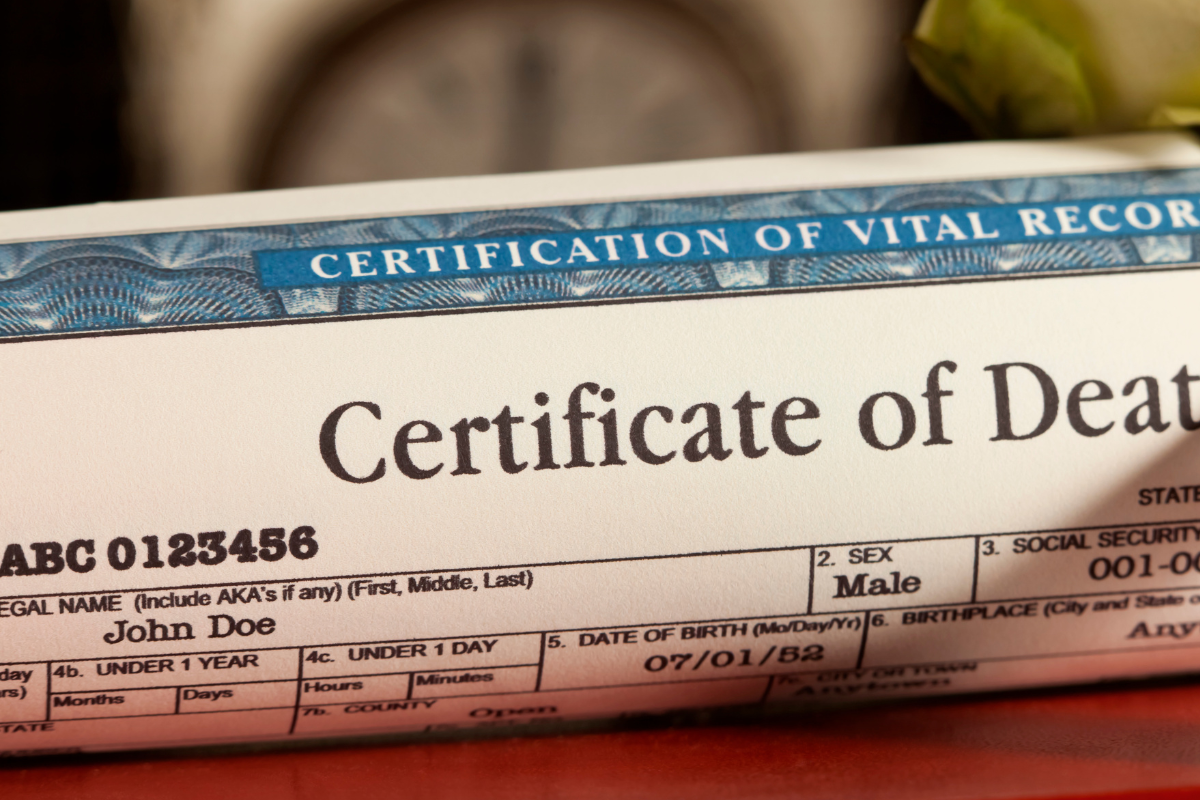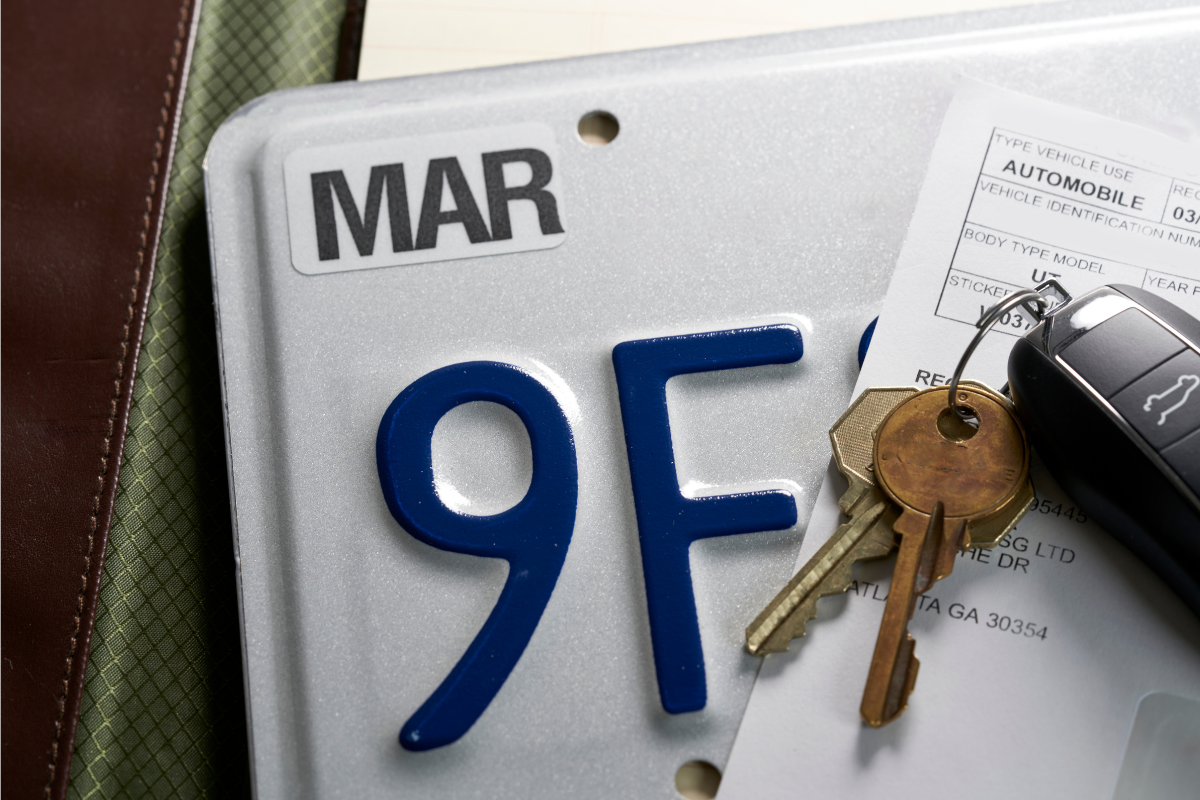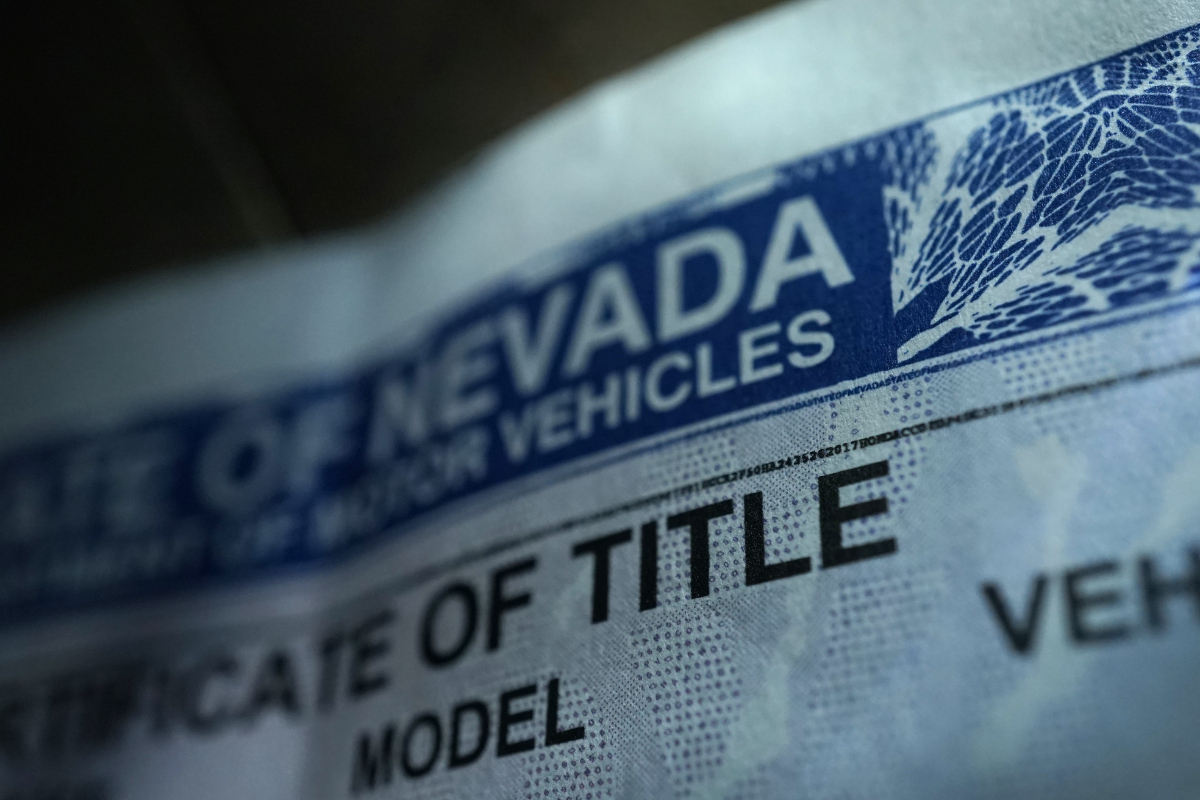Post Disclaimer: This blog reflects the author's personal experience with end-of-life matters and is provided in good faith for informational purposes only. While we aim to provide clear guidance on hard-to-find topics, this content is not legal advice and your use is at your own risk. Estate planning and end-of-life laws vary by location, so please consult your state's laws and seek guidance from a licensed attorney for your specific situation. We make no warranty about the accuracy or completeness of this information, which does not replace professional legal counsel. For more information, please see our full disclaimer.
Dealing with the administrative processes following the death of a loved one can be overwhelming, and notifying the DMV is a crucial step that's often overlooked.
Properly managing a family member's driver's license, vehicle registration, and titles prevents future complications when they pass away.
To report a death to the DMV, obtain a certified death certificate and the deceased's driver's license. Submit these documents to your local DMV office either in person or by mail, along with any state-specific forms. Most states require notification within 30 days of death to prevent identity theft and maintain accurate records.
This isn't just about following rules—it's about safeguarding your family from potential identity theft and keeping records straight for legal and financial reasons.
Whether you need to cancel a license, retitle a vehicle, or handle registration, knowing the DMV's procedures and tips for interaction can make the process smoother.
Understanding what documents you need and how to communicate with your state's DMV efficiently will save you time and stress.
Properly managing a family member's driver's license, vehicle registration, and titles prevents future complications when they pass away.

Understanding DMV Notification Requirements
Losing a loved one is a profoundly challenging experience, and dealing with their affairs can add an extra layer of stress.
An essential task is notifying the DMV about their passing.
While this might seem like just another item on a long list, it's important for avoiding future headaches related to vehicle ownership and identification records.
Legal Necessity of Notification
When someone passes away, the Social Security Administration typically informs the DMV, but it's not a guarantee.
Proactively contacting the DMV yourself ensures no loose ends. Notifying the DMV might feel redundant, but it safeguards against potential issues with your loved one's records.
For more on this topic, see Does The DMV Know When Someone Dies?.
Why the fuss about direct notification?
The DMV manages driver's licenses, vehicle registrations, and critical legal documents.
Clearing up any records promptly helps prevent misunderstandings or fraudulent activity.
When you notify them, you should:
- Provide a certified copy of the death certificate.
- Indicate any vehicles registered to the deceased.
- Submit the deceased's driver's license if possible.
These steps help terminate the license and update vehicle records promptly.
Official DMV guidelines, like those provided by the NY DMV, often require these documents to ensure a seamless transition.
Consequences of Not Notifying DMV
Skipping this step can lead to unnecessary complications.
Imagine dealing with outstanding traffic tickets issued to your late family member or finding unresolved vehicle registrations still under their name.
Left unhandled, these issues could escalate, leaving you to face legal challenges or fines.
Discovering this later is not just frustrating but could have financial implications.
Notifying the DMV also affects estate management. If the vehicle isn't correctly retitled, it can muddy the waters when distributing your loved one's assets.
To avoid these pitfalls, as noted in this guide on DMV notifications, timely communication is crucial.
Keeping things organized posthumously isn't just about meeting bureaucratic requirements.
It's about easing the path forward, ensuring you can focus on what truly matters during such a difficult time.
By taking these steps, you ensure everything is accounted for, leaving no room for confusion or mismanagement later.

Preparing for Your DMV Visit or Call
One necessary step in managing the tasks that follow a loved one's death
Handling the paperwork and notifications after a loved one's death can feel daunting.
One crucial task is to inform the DMV about their passing. This process helps in managing vehicle titles, registrations, and driver's licenses accurately.
Arm yourself with essential documents and information to make your DMV visit or call efficient.
Required Documentation
When notifying the DMV of a family member's death, having the right documents ready will streamline the process:
- Death Certificate: This is a fundamental document that confirms the deceased's passing. You can find more about its importance at DMV Virginia.
- Identification of the Deceased: This includes their driver’s license or state-issued ID. The DMV might require a physical copy, so prepare accordingly.
- Vehicle Documentation: Gather any titles, registration papers, and insurance documents related to the deceased's vehicles. Such documents ensure you can facilitate transfers or cancellations smoothly, as explained by NY DMV.
Bringing all necessary documents prevents multiple trips or calls to the DMV, saving you time and hassle.
Information to Collect Before Contacting DMV
Before contacting the DMV, collect and verify all pertinent details. Accurate information helps in avoiding complications and delays:
- Full Name and Date of Birth: Essential for verifying records and ensuring that the right person’s information is updated.
- Driver's License Number: This identifier is critical for processing requests related to the driver's license and vehicle registrations.
- Vehicle Information: Details like the Vehicle Identification Number (VIN), license plate number, and registration status may be required to update records accurately. Check out the California DMV's Information Resource for more on handling vehicle records.
Having this information at your fingertips makes your communication with the DMV quick and effective, allowing for a smoother transition during a challenging time.
By tackling these administrative tasks with preparation, you can focus on honoring your loved one’s memory rather than navigating red tape.

DMV Contact Information
One necessary step in managing the tasks that follow a loved one's death is notifying the DMV about their passing.
This section guides you on how to contact the DMV and what resources are available to assist you, helping to make this process smoother during a challenging time.
Phone Numbers and Online Services
Reaching out to the DMV often starts with a phone call.
Each state's DMV has different contact numbers and services to address various needs.
Many DMVs also offer online services that can make the notification process more efficient.
You can often report a death, update records, or find specific forms online.
See the Resources sections at the end of the post for a complete listing of DMV contact information, by state, plus the District of Columbia.

Steps to Take After Notification
Once you've gathered the necessary documents and informed the DMV of a family member's passing, the next critical task is handling their driver's license, vehicle registration, and ownership in an orderly manner.
By following the steps outlined below, you can ease some of the logistical burdens that accompany this life transition.
Cancellation of Driver's License
Canceling the deceased's driver's license is essential to prevent identity theft and ensure records remain accurate.
Here's how you can do it:
- Obtain a Certified Death Certificate: This document is critical for all related procedures.
- Return the Driver's License: Mail or bring the license and death certificate to your local DMV office.
- Submit Required Forms: Some states may require additional forms, which you can usually find on the DMV's website. For instance, Georgia's Department of Driver Services outlines the steps clearly.
- Follow Up: After submitting the documents, confirm that the cancellation has been processed. More guidance can be found in this detailed post.
By promptly canceling the license, you protect the deceased’s identity and clean up their official records.
Handling Vehicle Registration and Plates
Dealing with vehicle registration is another key step to avoid future complications.
Here’s what you need to do:
- Contact the DMV: Explain that the vehicle owner has passed away and inquire about specific requirements in your state.
- Provide Necessary Documents: You'll typically need the vehicle's registration, title, and death certificate. Check state-specific resources like the New York DMV's guide for further instructions.
- Return or Transfer Plates: If the vehicle is to be kept within the family, you might need to surrender the plates or transfer them.
- Update Registration: If an heir takes over the vehicle, the registration must be updated to reflect this new ownership, as outlined in this guide.
These steps ensure that vehicle records are current and correct, preventing legal hiccups.
Retitling a Vehicle to an Heir
Transferring vehicle ownership to an heir involves precise documentation and sometimes legal intervention.
Here’s a straightforward path:
- Gather Required Papers: These include the death certificate, vehicle title, and your identification. In some cases, you might need a probate court order if the estate exceeds a specific value, as detailed by Wisconsin's DMV.
- Complete Transfer Forms: Depending on your state, you may need to fill out specific forms to initiate retitling. Visit this resource for more insights.
- Submit to DMV: Bring or mail all documents to the DMV to finalize the transfer.
- Clarify Insurance: Check with the insurance provider to ensure no lapse in coverage after the transfer.
By following these steps, you can shift the vehicle title without unnecessary hassle, efficiently securing the asset for its new owner.

Tips for a Smooth DMV Experience
Timing is everything when planning your DMV visit.
Dealing with the DMV after a family member's passing can be a daunting task.
However, you can make the process smoother with preparation and a mindful approach.
Be Prepared for Wait Times
Timing is everything when planning your DMV visit.
Long wait times can be frustrating, so choosing the best time to visit is crucial.
According to experts, the middle of the week and the middle of the month are the least busy.
Avoid Mondays, Fridays, or any time just before or after a holiday, as these are the busiest.
Here are a few tips to reduce your wait:
- Use Online Services: Before heading to the DMV, check if the service you need can be online.
- Schedule Your Visit: If your DMV allows appointments, take advantage. This can help you avoid standing in long lines.
- Visit During Off-Peak Hours: Aim for mid-morning or early afternoon visits with lighter foot traffic.
Taking these steps will help you save time and energy.
Stay Calm and Patient
Visiting the DMV after losing a loved one can be emotionally exhausting.
It's essential to maintain your composure and stay patient throughout the process.
Remember, the DMV staff is there to help, even if the interactions might not always feel personal.
Here are some strategies to help you remain calm:
- Practice Deep Breathing: This simple technique can significantly reduce stress levels. As highlighted by DriveWise, deep breathing exercises are effective in calming nerves.
- Expect Delays: Understand that delays are common. To maintain a relaxed mind, carry a book or listen to a podcast while you wait.
- Positive Self-talk: Remind yourself of the task's importance and your ability to handle it. Keeping a positive outlook can be a mental anchor.
- Engage with Respect: Always approach DMV staff respectfully, even if things aren't moving as quickly as you'd like. This approach can often lead to better service and a smoother overall experience.
Approaching the DMV with a calm and prepared mindset can transform a potentially stressful situation into a manageable task.
Remember, each step you take brings you closer to resolving these necessary tasks.

Wrap-up: Reporting a Death to the DMV
Handling a loved one's DMV details after passing is more than a checkbox.
It's about preventing future issues and making sure everything remains orderly.
Swift notification to the DMV can stop problems like identity theft or unresolved tickets.
Organizing paperwork—like the death certificate, driver's license, and vehicle documents—before reaching out saves time and stress.
Canceling the driver's license avoids misuse while closing vehicle registrations and reassigning ownership to keep legal matters tidy.
Retitling vehicles to heirs ensures a smooth transition and respects the deceased's wishes.
These steps, though challenging, help you close a chapter securely while focusing on honoring your loved one's memory.
What steps will you take first to ease this process?
Consider bookmarking this guide for a calmer, prepared path forward.
Visit relevant DMV sites and make the journey a little easier for yourself.
Resources: Reporting a Death to the DMV
Comprehensive DMV Contact List for Death Notifications
- Alabama
- Department of Public Safety
- Address: 500 Dexter Avenue, Montgomery, AL 36104
- Phone: (334) 242-4400
- Online Resource: https://www.alea.gov/dps/driver-license/driver-license-forms
- Note: No specific online form; contact DMV directly
- Alaska
- DMV – Dept. of Motor Vehicles
- Address: 2150 E. Dowling Road, Anchorage, AK 99507
- Phone: (907) 269-5551
- Online Resource: https://doa.alaska.gov/dmv/forms/pdfs/411.pdf
- Note: Form to cancel a driver's license of a deceased person
- Arizona
- Department of Transportation, Motor Vehicles Division
- Address: P. O. Box 2100, Mail Drop 500M, Phoenix, AZ 85001-2100
- Phone: (602) 255-8152
- Online Resource: https://azdot.gov/motor-vehicles/vehicle-services/vehicle-title-and-registration/transfer-title-deceased-owner
- Note: Information on transferring title from a deceased owner
- Arkansas
- Office of Driver Services
- Address: 7th & Wolfe Street, Joel Ledbedder Building, Room 126, Little Rock, AR 72203
- Phone: (501) 682-7060
- Online Resource: https://www.dfa.arkansas.gov/driver-services/
- Note: No specific online form; contact DMV directly
- California
- DMV – Department of Motor Vehicles
- Address: 2415 First Avenue, Sacramento, CA 95818
- Phone: (916) 657-7677
- Online Resource: https://www.dmv.ca.gov/portal/handbook/vehicle-industry-registration-procedures-manual-2/transfers/deceased-owners/
- Note: Information on handling vehicle registration for deceased owners
- Colorado
- Dept. of Revenue, Motor Vehicle Division
- Address: 1881 Pierce Street, Lakewood, CO 80214
- Phone: (303) 205-5600
- Online Resource: https://dmv.colorado.gov/deceased-persons
- Note: Information on handling DMV matters for deceased persons
- Connecticut
- Department of Motor Vehicles
- Address: 60 State Street, Wethersfield, CT 06161
- Phone: (860) 566-4710
- Online Resource: https://portal.ct.gov/DMV/Registration/Registration/Deceased-Owner
- Note: Information on transferring vehicle ownership after death
- Delaware
- Dept. of Public Safety, Motor Vehicle Division
- Address: P.O. Box 698, Dover, DE 19903
- Phone: (302) 739-2500
- Online Resource: https://www.dmv.de.gov/VehicleServices/titles/index.shtml
- Note: No specific online form; contact DMV directly
- District of Columbia
- Bureau of Motor Vehicle Services
- Address: 301 "C" Street, NW, Washington, DC 20001-2100
- Phone: (202) 727-1159
- Online Resource: Not available; contact DMV directly
- Florida
- DMV – Dept. of Motor Vehicles
- Address: 2900 Apalache Pkwy, Room B435, Neil Kirkman Bldg, Tallahassee, FL 32399
- Phone: (850) 414-2426
- Online Resource: https://www.flhsmv.gov/pdf/forms/82050.pdf
- Note: Application for vehicle transfer after death of registered owner
- Georgia
- Department of Public Safety, Driver Services Division
- Address: 959 East Confederate Avenue SE, Atlanta, GA 30316
- Phone: (404) 657-9300
- Online Resource: https://dds.georgia.gov/general-forms
- Note: No specific online form; contact DMV directly
- Hawaii
- Motor Vehicle Safety Office
- Address: 1505 Dillingham Boulevard, Honolulu, HI 96817
- Phone: (808) 832-5820
- Online Resource: https://hidot.hawaii.gov/highways/library/motor-vehicle-forms/
- Note: No specific online form; contact DMV directly
- Idaho
- Transportation Department, Division of Motor Vehicles
- Address: P. O. Box 7129, Boise, ID 83707-1129
- Phone: (208) 334-8000
- Online Resource: https://itd.idaho.gov/itddmv/
- Note: No specific online form; contact DMV directly
- Illinois
- Motorist Services, Vehicle Services Department
- Address: 501 South 2nd Street, Springfield, IL 62756
- Phone: (217) 782-6992
- Online Resource: https://www.ilsos.gov/departments/vehicles/title_and_registration/faq.html
- Note: Information on transferring titles after death
- Indiana
- Bureau of Motor Vehicles
- Address: 100 North Senate Avenue, Room N440, Indianapolis, IN 46204
- Phone: (317) 233-2349
- Online Resource: https://www.in.gov/bmv/titles/transfer-to-beneficiary/
- Note: Information on transferring titles to beneficiaries
- Iowa
- Department of Transportation, Motor Vehicle Division
- Address: P. O. Box 9204, Des Moines, IA 50306-9204
- Phone: (515) 237-3202
- Online Resource: https://iowadot.gov/mvd/vehicleregistration/vehicle-registration/transfer-of-ownership
- Note: Information on transferring ownership, including after death
- Kansas
- Department of Revenue, Division of Motor Vehicles
- Address: Sheila Walker, Topeka, KS 66626-0001
- Phone: (913) 296-3660
- Online Resource: https://www.ksrevenue.gov/dovtitle.html
- Note: No specific online form; contact DMV directly
- Kentucky
- Division of Vehicle Licensing, Title Branch
- Address: P.O. Box 2014, Frankfort, KY 40602
- Phone: (502) 564-5301
- Online Resource: https://drive.ky.gov/motor-vehicle-licensing/Pages/Vehicle-Titling.aspx
- Note: Information on vehicle titling, including transfer after death
- Louisiana
- Office of Motor Vehicles
- Address: P. O. Box 64886, Baton Rouge, LA 70896
- Phone: (504) 925-6335
- Online Resource: https://expresslane.dps.louisiana.gov/
- Note: No specific online form; contact DMV directly
- Maine
- Bureau of Motor Vehicles, Secretary of State
- Address: 29 State House Station, Augusta, ME 04333-0029
- Phone: (207) 287-9006
- Online Resource: https://www.maine.gov/sos/bmv/forms/
- Note: No specific online form; contact DMV directly
- Maryland
- Motor Vehicle Administration
- Address: 6601 Ritchie Highway, Glen Burnie, MD 21062
- Phone: (410) 768-7274
- Online Resource: https://mva.maryland.gov/about-mva/Pages/info/27300/27300-65T.aspx
- Note: Information on transferring vehicle ownership after death
- Massachusetts
- Registry of Motor Vehicles
- Address: P.O. Box 199100, Boston, MA 02119-9100
- Phone: (617) 351-4500
- Online Resource: https://www.mass.gov/guides/transfer-ownership-of-a-vehicle
- Note: Information on transferring vehicle ownership, including after death
- Michigan
- Department of State, Driver and Vehicle Records
- Address: 7064 Crowner Drive, Lansing, MI 48918
- Phone: (517) 322-1000
- Online Resource: https://www.michigan.gov/sos/vehicle/title-transfers
- Note: Information on title transfers, including after death
- Minnesota
- Department of Public Safety, Driver and Vehicle Services
- Address: 445 Minnesota Street, St. Paul, MN 55101
- Phone: (612) 296-9525
- Online Resource: https://dps.mn.gov/divisions/dvs/forms-documents/Documents/MV-Transfer-Dead-Owner.pdf
- Note: Form for transferring ownership after death
- Mississippi
- Driver Services Bureau
- Address: P. O. Box 958, Jackson, MS 39205
- Phone: (601) 987-1200
- Online Resource: https://www.dor.ms.gov/tags-vehicles/vehicle-services
- Note: No specific online form; contact DMV directly
- Missouri
- Department of Motor Vehicles
- Address: P. O. Box 629, Jefferson City, MO 65105
- Phone: (573) 751-4509
- Online Resource: https://dor.mo.gov/forms/108.pdf
- Note: Application for Missouri title and license
- Montana
- Motor Vehicle Division
- Address: P. O. Box 201430, 303 North Roberts, Helena, MT 59620-1430
- Phone: (406) 444-4536
- Online Resource: https://dojmt.gov/driving/driver-licensing/#DLID
- Note: No specific online form; contact DMV directly
- Nebraska
- Department of Motor Vehicles
- Address: 301 Centennial Mall South, Lincoln, NE 68509
- Phone: (402) 471-2281
- Online Resource: https://dmv.nebraska.gov/dvr/titles/death-titleholder
- Note: Information on title transfer after death of titleholder
- Nevada
- DMV – Department of Motor Vehicles and Public Safety
- Address: 555 Wright Way, Carson City, NV 89711-0400
- Phone: (702) 687-5505
- Online Resource: https://dmvnv.com/deceased.htm
- Note: Information on vehicle registration for deceased persons
- New Hampshire
- Department of Safety, Division of Motor Vehicles
- Address: James H. Hayes Bldg, Ten Hazen Drive, Concord, NH 03305
- Phone: (603) 271-2589
- Online Resource: https://www.nh.gov/safety/divisions/dmv/forms/documents/tdmv23.pdf
- Note: Notification of death and release of ownership
- New Jersey
- Motor Vehicle Services
- Address: 225 East State Street, CN 160, Trenton, NJ 08666
- Phone: 1-888-486-3339
- Online Resource: https://www.state.nj.us/mvc/vehicles/transowner.htm
- Note: Information on transferring ownership, including after death
- New Mexico
- Taxation & Revenue Dept., Motor Vehicle Division
- Address: P. O. Box 1028, Joseph Montoya Building, Santa Fe, NM 87504-1028
- Phone: 1-888-MVD-INFO
- Online Resource: https://www.mvd.newmexico.gov/vehicles/vehicle-title-and-registration/
- Note: No specific online form; contact DMV directly
- New York
- State Dept. of Motor Vehicles
- Address: 6 Empire State Plaza, Albany, NY 12228
- Phone: Upstate: 1-800-CALL-DMV
- Online Resource: https://dmv.ny.gov/registration/transfer-ownership-deceased-owner
- Note: Information on transferring ownership after death
- North Carolina
- Division of Motor Vehicles
- Address: 1100 New Bern Avenue, Raleigh, NC 27697
- Phone: (919) 715-7000
- Online Resource: https://www.ncdot.gov/dmv/title-registration/vehicle/Pages/vehicle-titling.aspx
- Note: Information on vehicle titling, including transfer after death
- North Dakota
- Driver's License and Traffic Safety Division
- Address: 608 East Boulevard Avenue, Bismark, ND 58505-0700
- Phone: (701) 328-2725
- Online Resource: https://www.dot.nd.gov/divisions/mv/vehicle.htm
- Note: No specific online form; contact DMV directly
- Ohio
- Bureau of Motor Vehicles
- Address: 1970 West Broad Street, Columbus, Ohio 43223
- Phone: (614) 752-7600
- Online Resource: https://www.bmv.ohio.gov/titles-transfer.aspx
- Note: Information on title transfers, including after death
- Oklahoma
- Department of Public Safety, Accident Records Division
- Address: 3600 North Martin Luther King Boulevard, Oklahoma City, OK 73111
- Phone: (405) 425-2000
- Online Resource: https://oklahoma.gov/tax/motor-vehicle.html
- Note: No specific online form; contact DMV directly
- Oregon
- DMV – Driver & Motor Vehicle Services Branch
- Address: 1905 Lana Avenue, Salem, OR 97314
- Phone: (503) 945-5000
- Online Resource: https://www.oregon.gov/odot/dmv/pages/driverid/suspdeceased.aspx
- Note: Information on reporting a deceased driver
- Pennsylvania
- Department of Transportation, Driver and Vehicle Services
- Address: 1101-1125 South Front Street, Harrisburg, PA 17104
- Phone: (717) 391-6190
- Online Resource: https://www.dmv.pa.gov/VEHICLE-SERVICES/Title-Registration/Pages/Transfer-Ownership.aspx
- Note: Information on transferring ownership, including after death
- Rhode Island
- Motor Vehicles
- Address: 286 Main Street, Pawtucket, RI 02860
- Phone: (401) 277-2970, ext. 2039
- Online Resource: http://www.dmv.ri.gov/registrations/titles/
- Note: No specific online form; contact DMV directly
- South Carolina
- Division of Motor Vehicles
- Address: P. O. Box 1498, Columbia, SC 29216
- Phone: (803) 737-1654
- Online Resource: http://www.scdmvonline.com/Vehicle-Owners/Titling-a-Vehicle/Deceased-Person
- Note: Information on titling a vehicle of a deceased person
- South Dakota
- Department of Revenue, Division of Motor Vehicles
- Address: 445 East Capitol Avenue, Pierre, SD 57501-3185
- Phone: (605) 773-5335
- Online Resource: https://dor.sd.gov/individuals/motor-vehicle/
- Note: No specific online form; contact DMV directly
- Tennessee
- Department of Safety, Driver License Issuance Division
- Address: 1150 Foster Avenue, Nashville, Tennessee 37249-1000
- Phone: (615) 741-3954
- Online Resource: https://www.tn.gov/revenue/title-and-registration/vehicle-titling---registration.html
- Note: No specific online form; contact DMV directly
- Texas
- Department of Transportation, Correspondence Section
- Address: P. O. Box 12098, Austin, TX 78711-2098
- Phone: (512) 465-7611
- Online Resource: https://www.txdmv.gov/motorists/buying-or-selling-a-vehicle/inherited-vehicles
- Note: Information on inherited vehicles
- Utah
- Driver License Division
- Address: 4501 South 2700 West, Salt Lake City, Utah 84119
- Phone: (801) 965-4437
- Online Resource: https://dmv.utah.gov/vehicles/titles
- Note: Information on vehicle titles, including transfer after death
- Vermont
- Department of Motor Vehicles
- Address: State Office Building, 120 State Street, Montpelier, Vermont 05601
- Phone: (802) 828-2000
- Online Resource: https://dmv.vermont.gov/registrations/transfers
- Note: Information on transferring registrations, including after death
- Virginia
- DMV – Department of Motor Vehicles
- Address: P. O. Box 27412, Richmond, VA 23269
- Phone: (866) 368-5463
- Online Resource: https://www.dmv.virginia.gov/vehicles/#transfer.asp
- Note: Information on transferring titles, including after death
- Washington
- Department of Licensing
- Address: 1125 Washington Street, SE, P. O. Box 9020, Olympia, WA 98507-9020
- Phone: (360) 902-3600
- Online Resource: https://www.dol.wa.gov/vehicleregistration/transferdeath.html
- Note: Information on transferring vehicle ownership after death
- West Virginia
- DMV – Division of Motor Vehicles
- Address: 1800 Kanawha Boulevard East, Charleston, WV 25317
- Phone: 1-800-642-9066
- Online Resource: https://transportation.wv.gov/DMV/Vehicle-Services/Titles/Pages/TransferTitle.aspx
- Note: Information on transferring titles, including after death
- Wisconsin
- DMV – Division of Motor Vehicles
- Address: P.O. Box 7918, Madison, WI 53707-7918
- Phone: (608) 266-1466
- Online Resource: https://wisconsindot.gov/Pages/dmv/vehicles/title-plates/transfer.aspx
- Note: Information on transferring vehicle ownership, including after death
- Wyoming
- Department of Transportation, Driver Services Division
- Address: P. O. Box 1708, Cheyenne, WY 82003-1708
- Phone: (307) 777-4800
- Online Resource: http://www.dot.state.wy.us/home/titles_plates_registration.html
- Note: No specific online form; contact DMV directly
Please note that while these resources provide information related to reporting a death or transferring vehicle ownership after death, in many cases you may still need to contact the DMV directly or visit in person to complete the process.
Always check the most current information on your state's DMV website, as procedures and online resources may change.
Check out the Up & Doing glossary page for an alphabetical listing of key terms related to estate administration, funeral planning, and other end-of-life topics.




